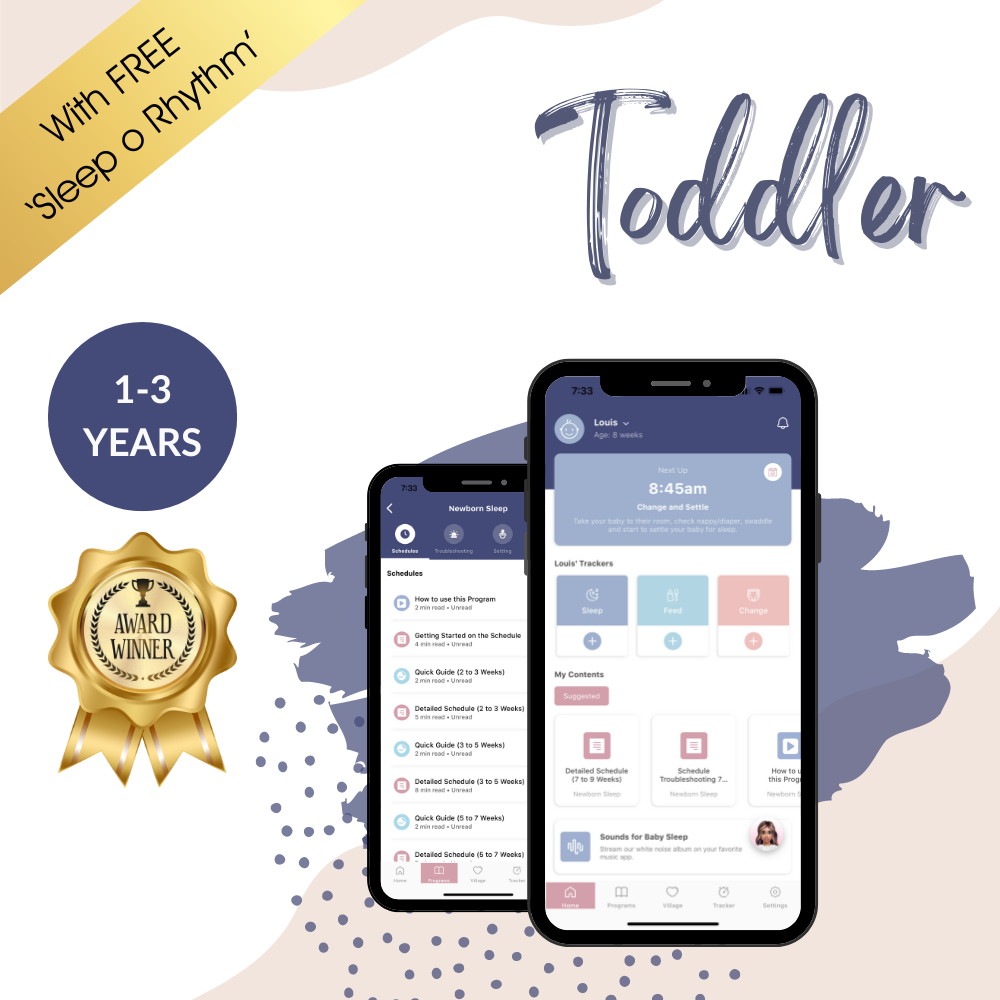
Developmental Leaps: What They Are & How They Affect Baby Sleep
After my eldest was born, I kept hearing other mums talking about their little one being in a ‘leap’ and how difficult it was. I had no idea what they were talking about!
After a brief internet search, I came across The Wonder Weeks and entered a whole new world of leaps, fussy periods, “the three C’s” and more. I learned a LOT.
If you've been in the dark about your baby's developmental leaps, read on to find out more about what happens during these leaps, how they affect your baby's sleep, and how you can navigate these tricky periods.
In this article:
- What are developmental leaps?
- Signs your baby is in a leap
- How do leaps affect your baby's settling and sleep?
- How long do developmental leaps last?
- How you can help your baby during a leap
- Toddler developmental leaps
Feeling confused about your baby's sleep needs?
Let our sleep experts help you every step of the way. Together we can solve your little one's sleep challenges
Get our Sleep Programs
What are developmental leaps?
You may have been in the same situation as me, listening to others talking about “leaps” and nodding along, wondering what they are talking about. Well fear not, soon you’ll be an expert on them!
Quite simply, a developmental leap is a period of intense mental development that your baby experiences.
According to The Wonder Weeks, babies will experience 10 mental leaps during their first 20 months of life. These leaps are linked to their corrected age, which is based on their due date rather than the date they were born.
Signs your baby is in a leap
During this time your baby has a lot going on. Their brain is so busy learning new skills, taking on more information and making major mental developments that it is bound to have a knock on effect.
Here are some signs that your baby might be in a leap:
- Increase in the ‘three C’s’: crying, clinginess and crankiness
- Change in sleeping patterns
- Their mood is more unpredictable
- Existing skills improving
- Learning new skills
- Separation anxiety
- Change in their health
- Fussiness when feeding
Let's break some of these signs down a bit further and look at what is going on for your little one during a developmental leap...
Change in mood or behaviour
The Wonder Weeks talks about an increase in the "three C’s" during a leap. These are:
- Crankiness
- Clinginess
- Crying
If you notice a big shift in your baby’s temperament then it is likely they may be going through a developmental leap. Their mind is doing extraordinary things right now and their world is changing. This is hugely daunting for a small baby who is still learning to make sense of the world.
Imagine if tomorrow you discovered that aliens lived among us or that you had the ability to fly. Your whole understanding of the world, and what you thought you knew, has suddenly been thrown into turmoil. You now have to learn how to make sense of this ‘new world’.
This is what your baby does during each developmental leap. As their perception of the world changes, they have to adjust to the new norm. During this unsettling time, it's understandable that your baby wants to feel safe and secure, which is why they may be more clingy than usual.
Although you might understand why your baby is crying more, not wanting to be put down or just constantly grumpy, these mood changes can still be tough on parents too. So don’t be afraid to ask for help if you need it.
Say goodbye to sleepless nights.
Join over 800,000 families worldwide who are enjoying excellent sleep with our Sleep Programs, created by experts in the field of pediatric sleep.
Get our Sleep Programs
Consider inviting a friend or family member over to entertain your little one and give you a break, or try venturing outside for some fresh air. Lots of babies enjoy being out and about, seeing new places and faces. It also helps to break up the day for you.
And remember - this won’t last forever.
Fussy feeding
During a leap, you may also notice that your baby suddenly seems less keen on feeding. Being fussy during feeds (whether breastfeeding, bottles or solids) is fairly common but luckily, tends to be short-lived.
Your might notice that your baby:
- Wants to feed more frequently than before
- Isn't interested in feeds at their usual feeding times
- Comes on and off the breast or bottle, or is easily distracted by what is going on around them
- Takes smaller quantities of milk, preferring to snack feed throughout the day
- Is fussy with solid food, even with foods they previously enjoyed
- Wants to snack more if they are on solids and eat smaller meals
Here are some tips to help your baby with their feeds during this time:
- Stay consistent with offering your baby their feeds at the usual times.
- Try feeding them in a quiet space if they are easily distracted.
- Make sure your little one is still having plenty of wet and soiled nappies. If you notice a change in the amount of wet nappies, consult your healthcare professional to rule out dehydration.
- If your baby is on solids, try eating with them so that they can mimic you eating.
- Ensure they have a favourite food on their plate or try presenting food in a different way, such as making a picture with the food or using an ice cube tray as a plate.
- Remain calm if they are being fussy - your baby will pick up on your stress or frustration. If they get upset, take a break, do something else and try again later.
If your baby is always fussy during their feeds, regardless of whether they are in a leap or not, you'll find some possible reasons for this here.
Change in health
Although less common, some parents also notice a deterioration in their baby’s health during a leap. The most common health issues experienced include:
- Colds
- Coughs
- Teething
- Ear infections
If you notice a change in your baby’s health, contact your doctor or health professional for further advice. If you're not sure whether your baby is unwell, we have some signs and symptoms to look out for here, as well as tips for how to care for a sick baby.
Learning new skills
So far, it seems like developmental leaps bring about a lot of negative changes. However, this one is a positive! This is the reward for coping with all those negatives... you get to witness your baby learning, developing and changing before your eyes.
Here are some of the highlights you can expect:
- Learning to smile
- Holding their head upright
- Rolling over
- Looking for main caregiver
- Holding toys
- Waving
- Playing peek-a-boo
- Babbling and ‘chatting’ with you
- Starting to role-play
- Vocabulary improvements
It is a joy to witness this growth and change your baby's development and it definitely helps to balance the scales a little more!
Let's get your little one's sleep sorted ASAP!Our award-winning Sleep Programs will solve your baby's sleep challenges in no time.
Get our Sleep Programs
How does a leap affect my baby's settling and sleep?
Not only has your happy baby suddenly had a personality transplant and turned into a misery but now you’re noticing a shift in their settling and sleep too. Don’t panic!
Your baby’s brain is developing rapidly during their leap, which can take a toll on their sleep but this is only temporary. This might look like:
- Resisting naps or bedtime. Your baby can find it harder to wind down, meaning they need a longer wind down time before sleep.
- Difficulties settling to sleep. Your baby may find it difficult to self-settle and instead, will need your help to settle to sleep or will only want to sleep when you are close to them.
- Waking more during the night. Your baby may wake more frequently or for longer during the night, to practise new skills they are trying to master during this leap.
- Waking early in the morning. Try to ensure your baby's room is promoting sleep and reinforce that it is time to sleep by keeping them in their bed for as long as they are happy.
- Wanting to feed more overnight. This can be because your baby isn't feeding well during the day or because they are using more energy and becoming more mobile.
- Having shorter naps. Catnapping can be common during this time as babies can find it harder to link their sleep cycles.
- More tired during the day. With all the extra mental stimulation, your baby can seem to struggle with their usual awake times. You may need to reduce their awake times a little while they are in a leap.
Often these are short-term changes and once your baby is out of the developmental leap, their sleep pattern should revert to normal.
Having said that, it is quite easy for new sleep habits to creep in during this time. For example, if your little one isn’t settling well, you might start actively settling them to sleep with patting, rocking or feeding. Then, once the leap is finished, instead of going back to self-settling, your baby continues to rely on you settling them to sleep. This is because the patting, rocking or feeding, has become a new sleep association for them.
To get your baby back to self-settling, you'll need to wean them off that new sleep association. Our Little Ones App can guide you through this, step-by-step, with several gentle methods to choose from that are tailored to your baby's age and current sleep association.
How long do developmental leaps last?
I know it can feel like your baby’s leap will never end but I promise you, it will!
Developmental leaps vary in length. The shortest leaps are just a week long and the longest are roughly five weeks. It may sound like a long time but even during the longer leaps, you will usually find that there are peaks and troughs. Some days you wouldn’t know they were in the middle of a leap and other days, you definitely know!
On the tough days try to remember that this is just a phase and "this too shall pass".
How can you help your baby during a leap?
The biggest way you can help your baby through their developmental leaps is to keep in mind that it is just a phase. Your baby isn’t broken, they’re just going through a lot right now!
Staying as consistent as possible with your baby's routine and settling is not only reassuring for them, but will also help their sleep to get back to normal again once they are out of the leap.
Here are our top tips for getting through your baby's developmental leaps:
- Stay calm and try to remember that leaps are a good thing - it means your baby is learning and developing as they should!
- Try to stick to your usual routine as much as possible.
- Try to avoid introducing new sleep associations that will be hard to wean your baby off later.
- Give your baby more physical contact - skin to skin can really help!
- Use a sling to keep your baby close by, while also keeping your hands free for other things.
- If you need a break, enlist some help from your partner, family or friends.
Toddler developmental leaps
Congratulations, you and your baby have successfully made it through the ten developmental leaps...so what now? Is it going to be smooth sailing from now on?
Unfortunately, no! Your toddler will still have periods of rapid mental and physical development. The good news is that now that they can understand more and communicate their needs more easily. The bad news is that they are still an irrational toddler who struggles to regulate their emotions, so you can probably expect a few tantrums here and there!
With each developmental milestone your toddler reaches though, you will be able to have more fun with them and see their personality coming out!
In summary...
Developmental leaps can be tough on babies and parents, however, they are a very normal part of your child's development. Leaps can affect your child in various ways but rest assured, these changes are usually temporary! The best thing you can do to help your baby or toddler through a leap is to try to stay as consistent as possible with your routine and settling until it passes.
If you find that your baby’s settling or sleep hasn't returned to normal after a leap, our Little Ones App has all the information and tools you need to get things back on track.
---------------
Bibliography
Age-Related Developmental Milestones (2022, March 3). The Observant Mom.
Developmental milestones: What they are. (2022). Plunket New Zealand. https://www.plunket.org.nz/child-development/child-development-milestones/developmental-milestones-what-they-are/
The Wonder Weeks | A smart start for a happy beginning! (2022, March 30). The Wonder Weeks. https://www.thewonderweeks.com/
The Wonder Weeks - Marco Plas, TEDxGlasgow

Receive product and services updates, promotional offers and other marketing communications based.





